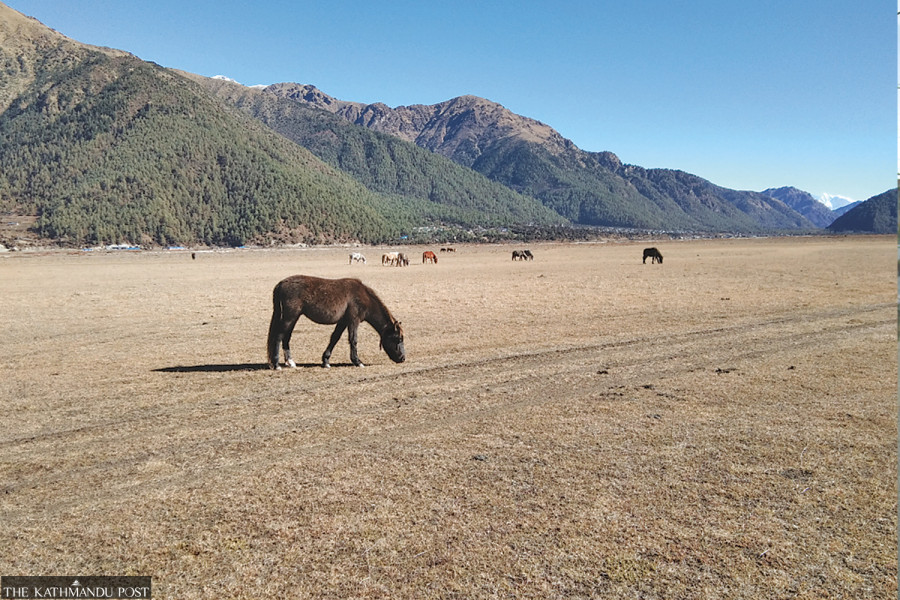Money
Nepal’s only hunting reserve is back in business
After the Covid pandemic, Dhorpatan reserve has started to draw foreigners who pay millions of rupees for the trophies of blue sheep and Himalayan Tahr.
Prakash Baral
Dhorpatan hunting reserve, Nepal’s only game sanctuary, is back in business.
The reserve, which saw diminished activity due to the Covid pandemic, has started to draw foreigners willing to pay millions of rupees to hunt blue sheep and Himalayan Tahr.
Due to the rise in the number of licensed hunters, the reserve collected Rs40.48 million in revenue in the first ten months of the current fiscal year.
Affluent hunters participate in the bid, which costs Rs1 million to Rs2 million for a hunting window in the alpine flat meadows of western Nepal.
The pastures above 4,000m, locally known as patan, are home to blue sheep, Himalayan Tahr, and many other animals.
Hunters, particularly those from the United States, Russia, Mexico, Spain and Germany, arrive in Nepal for the game. The reserve, established in 1987, is spread over 1,325 square kilometres.
In 2022, the reserve also allowed Nepali citizens to hunt wild boars to boost domestic tourism in the area.
The Department of National Parks and Wildlife Conservation fixes hunting quotas effective for two seasons a year.
Reserve officials said that revenue so far has been good, and if the trend continues, collections may reach a record-high by the end of the fiscal year in mid-July.
The hunting reserve gathered Rs30.48 million in the last fiscal year.
In the two seasons of the current fiscal year, 30 wild animals were hunted: 19 blue sheep and 11 Himalayan Tahr. The first hunting season closes in December and the second runs from mid-February to mid-April.
According to the Dhorpatan Hunting Reserve, it earned Rs40.26 million by issuing permits in the last fiscal year. In addition, the reserve collected Rs1.16 million from tourists in entry charges and Rs900,000 for using wood and water inside the area. The reserve charged Rs57,000 for helicopter landing permits.
In the fiscal year 2022-23, 7,645 tourists arrived in the reserve, which increased to 9,436 in the first ten months of the current fiscal.
Hunting is permitted based on the quotas determined by conservationists.
In the fiscal year 2021-22, 9,919 tourists visited the reserve, but the revenue amounted barely to Rs17.5 million.
The hunting reserve collected a meagre revenue of Rs3.7 million in the Covid-19 pandemic fiscal year of 2019-20 and a more dismal Rs2 million in the fiscal year 2020-21. Revenue collection gradually picked up after the pandemic.
With the increase in tourist numbers, activity in the park and its vicinity has also started rising. Local hotel owners have seen an expansion in business.
The reserve is divided into six blocks for hunting purposes. Nearly a third of the reserve area is flat grassland. Another third comprises forests and hills, whereas the remaining area is a buffer zone.
The reserve is home to 32 species of mammals and 130 bird species. According to the reserve office, there are around 852 Himalayan blue sheep and 200 Himalayan Tahrs in its forests. Snow leopard, Himalayan black bear, barking deer, spotted deer, red pandas, wild boar, and Himalayan goral, among other wildlife, are also found in the reserve, but their hunting is prohibited.
Domestic tourists arrive at Dhorpatan Hunting Reserve by vehicle via Burtibang of Baglung. In addition to the areas having a reserve office, domestic tourists also visit Jaljala and Niseldhor, while very few reach Buki, the alpine area of Nepal.
Foreign tourists coming for hunting stay for 2 to 3 weeks and reach Fagune, Dhustung, Dogadi, Barse and Surtibang by helicopter.
But illegal hunting has also thrived in the area.
According to the statistics with the reserve, two sets of illegal weapons were seized on March 8 with the help of Nepal Army. On March 29, nine sets of weapons were captured. Joint teams of soldiers and conservationists have also been seizing animal hides.
The seven blocks of the reserve cover Baglung, Myagdi, and Rukum districts, where the army's presence is limited.
If security patrols are increased, revenue collection will rise, and illegal hunting will decline, said Binod Bikram Basnet, an army officer in the area. The office also lacks the required number of staff.




 14.12°C Kathmandu
14.12°C Kathmandu.jpg)













